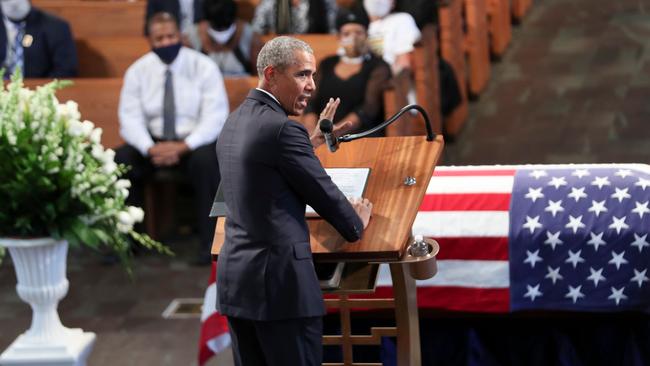
Last week, as the great civil rights leader John Lewis was laid to rest, the obsequies provided a fascinating glimpse of the changes in American politics in the past few years, in particular the sharp shift to the left in the Democratic Party.
In the same Ebenezer Baptist Church in Atlanta where Dr Martin Luther King Jr had been pastor, three former presidents delivered panegyrics to the man who had marched and suffered with Dr King for the human rights of fellow African-Americans, who later served with distinction as a congressman.
George W Bush, now enjoying the customary reverence the media has for all former Republican presidents which they never get during their time in office (wait till he dies: he’ll be a saint), noted Mr Lewis’s commitment to nonviolent protest.
But it was in the contrast between the speeches of Bill Clinton and Barack Obama, especially the reaction to them, that important clues about the direction of their party lay. In praising Mr Lewis, Mr Clinton emphasised the way he had pursued change through peaceful protest. He noted approvingly that Mr Lewis had fought an internal battle with Stokely Carmichael, his more radical rival, for leadership of the Student Nonviolent Coordinating Committee in the 1960s.
Mr Lewis won back control of the direction of the civil rights movement from Mr Carmichael (who later changed his name to Kwame Ture) after, as the former president put it, “the movement went a little too far towards Stokely”.
It was an aside, intended primarily to emphasise Mr Lewis’s resilience in the face of a setback, and you might think that a nod towards the case for a more nonviolent and inclusive approach to political change would be uncontroversial, but it caused a firestorm in Democratic ranks. Mr Clinton was widely denounced in his party, most notably by influential African-Americans. “Who is Bill Clinton to show up at a Black funeral and attack Stokely Carmichael?” tweeted Patrick Gaspard, a former senior official in the Obama administration who serves as head of the George Soros-funded Open Society Foundation. “Stokely is ours.”
I didn’t want to tweet this during the funeral for John Lewis, but who is Bill Clinton to show up at a black funeral to attack Stokely Carmichael? Stokely was ours. He was targeted for destruction by the FBI and forced into exile. He gave all for us. Bill Clinton ain’t no hero.
— Patrick Gaspard (@patrickgaspard) July 31, 2020
The debate over civil rights has reached a new intensity this summer and leading commentators seized on the former president’s remarks in now familiar terms. Van Lathan, a talk-show host, described Mr Clinton’s words as an avowal of “white supremacy”.
It’s worth recapping what Mr Ture stood for. He is mostly remembered as an advocate of a black-only civil rights movement. He rejected the views of those such as Mr Lewis who sought to work with white allies to achieve progress. He was hounded by Edgar Hoover’s FBI and eventually fled into exile. But he was known too for some highly controversial opinions. These included observations about Jews that were widely regarded as antisemitic, including denunciations of Israel and its supporters as “Zionist pigs”.
Mr Clinton, by dint of his cultural roots in the south and an almost preternatural feel for African-American voters, was often jokingly called America’s “first black president”. But that’s the kind of joke that would get you banned from a university campus these days and it seems Mr Clinton has surrendered any right to the title in any case.
Minutes after Mr Clinton, his successor as Democratic president took to the pulpit. Mr Obama’s oration was radically different in tone and content. The former president who, remember, was also elected in part because he articulated an inclusive, constructive approach to political change ("There is not a black America and a white America and Latino America and Asian America – there’s the United States of America"), delivered a speech of raw partisan demagoguery.
In recounting Mr Lewis’s resistance against the racist thugs who controlled the Deep South in the 1960s, he suggested that the America of 2020 was little changed. He directly compared the violence used by police against the civil rights marchers back then with the federal government’s measures to restore order in the nation’s cities during this summer of disorder. “George Wallace may be gone. But we can witness our federal government sending agents to use tear gas and batons against peaceful demonstrators.”
This is, by any stretch of the imagination, an extreme caricature of the state of the US. While no one doubts that racism remains a dark reality, the idea that today’s nation treats African-Americans as the infamous governor of Alabama did in 1968 is ridiculous.
Mr Obama didn’t stop there. He offered a practical solution for modern revolutionaries. Denouncing the Senate’s procedural rule that requires a 60-vote supermajority to pass legislation, as a “Jim Crow relic” from the age of racial segregation, he called for its abolition if Democrats win control in November.
This would be truly radical. It would do away with a vital balancing check in the political system that has long been regarded as central to ensuring some stability by requiring a wide consensus for change.
In the age of Donald Trump, and perhaps even more in the post-Trump age, the poles of American politics are diverging and there’s no clearer evidence than the divergent paths of the last two Democrats to hold the presidency.
The Times




Unseemly though it can be, the funeral oration has long provided a platform for politicians to draw attention to themselves and their causes. From Pericles and Mark Antony to the animated speakers at the infamous requiem-cum-rally for Democratic senator Paul Wellstone, killed in a plane crash in 2002, ambitious eulogists rarely miss the opportunity of a reflection on lives lost to make a case for how to change lives still being lived.